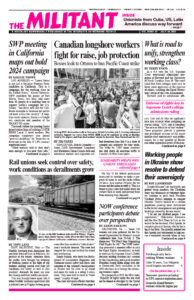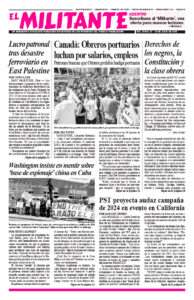July 28, 1998
FLINT, Michigan — As the strikes by 9,200 workers at two General Motors plants here enter their second month, the world’s largest auto maker is taking new steps to pressure the workers and their union, the United Auto Workers.
GM “needs to cut more than 50,000 U.S. hourly positions to become as competitive as its rivals, even though it has already shed 64,000 jobs since 1992,” said the Wall Street Journal.
Reports began hitting the press July 2 that GM is looking for independent auto parts makers to supply the reopening of up to 10 assembly plants by early August. In another move, GM revived its threat to cut off health-care benefits for laid-off workers in the U.S.
July 27, 1973
Culebra is a small island some 20 miles off the east coast of Puerto Rico. Since 1936, Culebra has been regularly bombed, shelled, and strafed by the U. S. Navy. The complex of Caribbean islands euphemistically labeled the “Commonwealth of Puerto Rico” has been a U.S. colony since the end of the Spanish-American War.
In 1969, the residents of Culebra organized the Committee for the Rescue of Culebra. It gained the active support of the two major pro-independence organizations in Puerto Rico. As for Vieques, where the Navy conducts the same operations, the gradual takeover has desolated the island, once a thriving agricultural area.
July 19, 1948
American workers, like workers everywhere, are deeply interested in the break between Belgrade and Moscow. The enormous Stalinist apparatus of repression has finally cracked open. Each existing crack will deepen and widen. Through each opening, however narrow, the masses will tend to surge through.
Tito and Stalin want the workers to choose between them. They pose all questions as if everything comes down to a choice between a “better” man. These methods have nothing in common with real labor politics. The Tito-Stalin rift is bound to become the starting point for a discussion of ideas and questions which touch the vital interests of working people everywhere.

